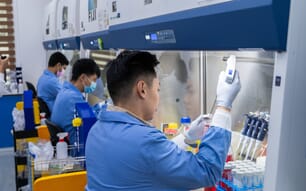Many Vibrio species thrive in warmer waters, and both their local abundance and their geographic range have expanded in the past decade as ocean temperatures have increased.
“My research interests include understanding how and why certain isolates of a particular bacterial species make us ill while others do not,” Boyd says. “The ubiquitous aquatic species Vibrio is of particular interest. V. vulnificus is an organism that can cause septicemia and wound infection with very high mortality rates in susceptible individuals.”
Boyd, whose area of specialty is bacterial population genetics and pathogenesis, is investigating what is known as “horizontal gene transfer” (HGT) in Vibrio species. HGT occurs when genetic material is transferred horizontally from one species to another through the environment rather than vertically from a species to its offspring. The phenomenon plays a critical role in evolution.
V. vulnificus, which causes significant economic losses in the eel aquaculture and occurs in high numbers in oysters and other molluscs, differs from other Vibrio species in that all of its strains appear equally pathogenic--that is, there is no definitive “virulence factor” that distinguishes between pathogenic and non-pathogenic V. vulnificus. “In most other enteric species, the pathogenic potential is limited to a few strains that encode specific virulence factors, many of which have been acquired through HGT,” Boyd says.
Integration of research and teaching is an important component of projects funded by the NSF Career program, and Boyd has extensive plans for using the research to provide students with fundamental training in evolutionary genetic analysis at the gene and genome levels.
She plans to bring Advanced Placement high school students into her lab during both the academic semester and the summer for experiential training. “We want to pique their interest and let them see what lab life is like before they get to college,” she says.
The project will also include summer research and honor's thesis opportunities for undergraduates, as well as training for graduate students. “I want to teach microbiology as it is practiced,” Boyd says, “to prepare students in the field for a lifetime of scientific inquiry through research.”
The research will also be incorporated into a new course on pathogenomics. Boyd touches on this topic now in a course she teaches on microbiology, but she would like to address it in more depth and provide students with more hands-on experience.
“We have a database of more than 2,000 bacterial genomes,” she says. “I want to use this tremendous resource to give students a feel for the amount of bacterial diversity that's out there.”
Boyd earned her B.S. and Ph.D. degrees at the National University of Ireland, Galway, and completed postdoctoral research appointments at Penn State, Harvard, and the Tufts University School of Medicine. She then returned to her native country, where she was a tenured lecturer with the Department of Microbiology at the National University of Ireland, Cork, before joining the UD faculty in 2006.
Boyd is the fourth UD faculty member to date to receive the NSF Career Award in 2009. Also receiving awards were Matthew Doty, assistant professor in the Department of Materials Science and Engineering; Christoper Meehan, assistant professor in the Department of Civil and Environmental Engineering; and Jingyi Yu, assistant professor in the Department of Computer and Information Sciences. Also this year, Joshua Zide, assistant professor in the Department of Materials Science and Engineering, received an Office of Naval Research Young Investigator Award.
Researcher Studies Microbes of Eels and Molluscs
US - Having been bestowed the NSF Career Award, E. Fidelma Boyd of the Department of Biological Sciences will develop Vibrio vulnificus, an important bacterial component of the aquatic coastal ecosystem, as a model organism for understanding the emergence of pathogenic microbes and the role of global environmental change in this process.




